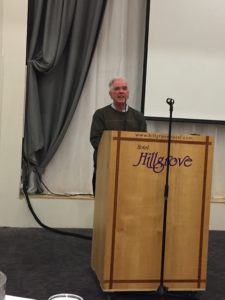The annual clergy conference of the Diocese of Clogher was held on Wednesday 19 October in Monaghan. The attendance included the two Bishops-Emeritus of the diocese, recently retired Bishop Liam MacDaid and his predecessor Bishop Joseph Duffy. The proceedings were presided over by the Diocesan Administrator, Monsignor Joseph McGuinness.
God of Mercy: Church of the Poor
For the past year, the Catholic Church has observed an Extraordinary Jubilee Year of Mercy, proclaimed by Pope Francis and which is due to end in local parishes on Sunday 13 November next. This theme of mercy was very much to the fore at the conference. The guest speaker was Fr Peter McVerry SJ who spoke on the topic ‘The God of Mercy: A Church for the Poor’. Fr McVerry is well known for his work with the homeless and disadvantaged and as an advocate for social inclusion.
In his challenging words, he reflected on a number of key questions relevant to the church today. His analysis drew on both the rich deposit of Scripture and his own vast experience of working with the homeless and with prisoners. He invited the conference to reflect on this in the work of the diocese, and how that work reflects a God of mercy and compassion more than a God of law and regulation.
In essence, Fr McVerry asked three questions: 1. What is the Good News of the Gospel that Jesus gives to the poor? 2. Has the message of Jesus changed and why are so many people, especially young people, not participating in the Church? 3. How could Jesus have been crucified, simply for calling on people to love one another?
Fr McVerry commented that the disadvantaged in society are often invisible. ‘There are homeless people in Trinity College, in UCD, in Maynooth etc. No one knows that they are homeless. Homelessness covers a broad spectrum of people’, he said. He went on to give examples of many young people who had been abandoned by their families or forced into lives that bring them to the margins of society. These people, he said, end up taking drugs, not out of curiosity, but to escape from the pain of traumatic experiences, some at a very early age. ‘Drugs work to blot out memories. One young person said to me recently: “Wouldn’t it be wonderful to run so fast your memories can’t catch you?”’.
He told the gathering that drugs misuse is a clear sign of deeper problems to be addressed.
Fr McVerry said that in his earlier life, like most others of his generation, he believed in a God who was a judge, a lawgiver who judged us by our observances. His experiences with young people and those enslaved in a life of drugs changed his perception of God. He came to reject the God of the law and to see God as a God of compassion. All of us, he said, as members of the Church – the Christian community – must see people as they are, just as Jesus did. ‘People sometimes react in the only way they know. Don’t write them off; do not judge them’, he said.
The conference was then offered a variety of scriptural texts which reflected on the theme of riches and mercy and, especially, on the kingdom of God. He spoke of Jesus’ call to make the Kingdom of God present in the world through social justice, compassion and solidarity: ‘Thy kingdom come, Thy will be done”.
‘Ultimately’, he said, ‘if we are to follow Jesus we must be prepared to give up our possessions and to share. The caring and sharing dynamic of our Christian communities must be radical signs of our embrace of the kingdom of God here on earth’. This, he described as ‘Jesus’ dream of building a just and happy world’. This has an ecumenical dimension too, he argued. ‘What unites us as Christians is sharing Jesus’ vision’.
He called on priests and lay people to open their hearts to the poor and pointed to the commitment of so many young people today to social justice and solidarity with the poor and the marginalised. ‘We categorise practicing Catholics as those who go to Mass. Many young people today do not go to Mass but will do anything to support the needy – to realise Jesus’ dream. Unless we as a Church rediscover the centrality of social justice to our mission, young people are going to continue to walk away!’
Fr McVerry concluded his talk by offering some answers to the questions he posed. The Good News that the Church can give to the poor is that there is a Christian community that is going to welcome them like Jesus and show solidarity. ‘Is that community a reality in our parishes?’, he asked. ‘The message of the Church needs to be one of outreach, sharing and witnessing to the values of Jesus, the values for which he was crucified. How do we do that? By being the heart of compassion’, he concluded.


